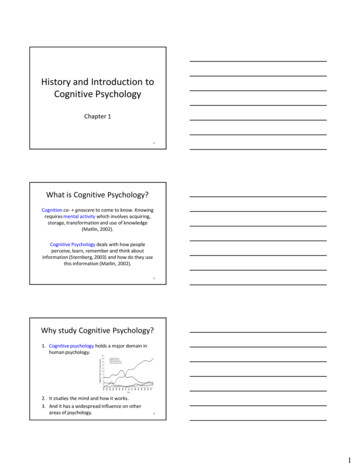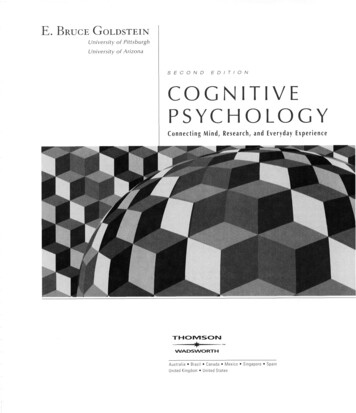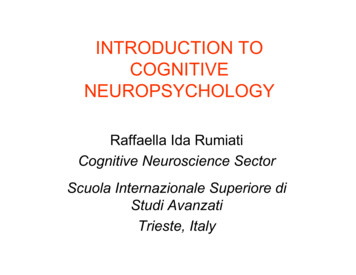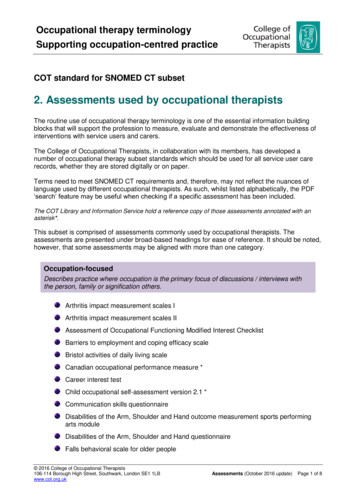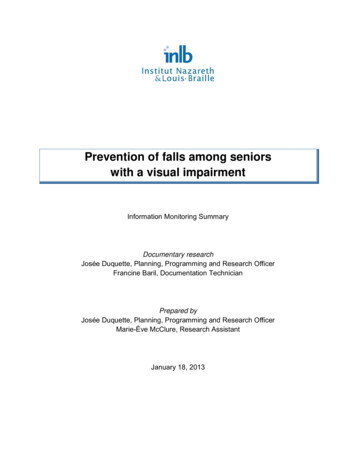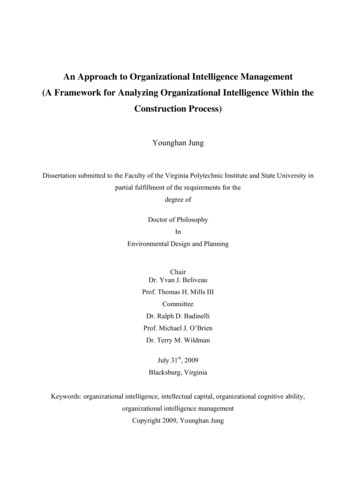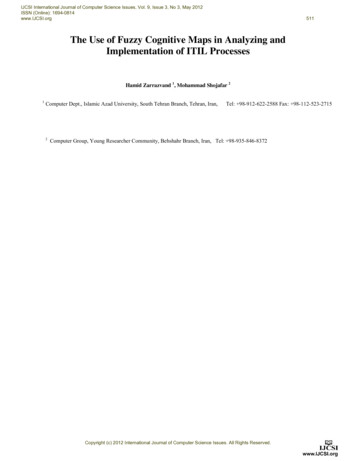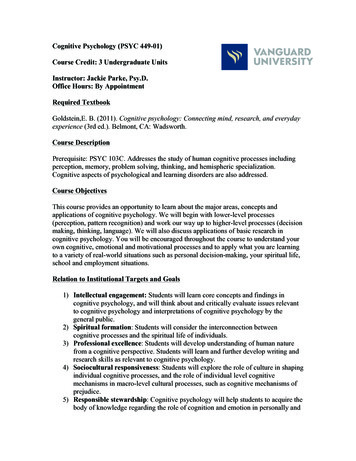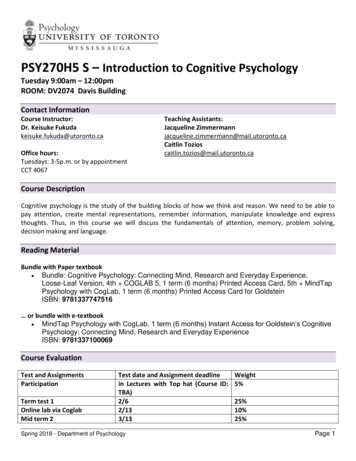
Transcription
PSY270H5 S – Introduction to Cognitive PsychologyTuesday 9:00am – 12:00pmROOM: DV2074 Davis BuildingContact InformationCourse Instructor:Dr. Keisuke Fukudakeisuke.fukuda@utoronto.caOffice hours:Tuesdays: 3-5p.m. or by appointmentCCT 4067Teaching Assistants:Jacqueline itlin Tozioscaitlin.tozios@mail.utoronto.caCourse DescriptionCognitive psychology is the study of the building blocks of how we think and reason. We need to be able topay attention, create mental representations, remember information, manipulate knowledge and expressthoughts. Thus, in this course we will discuss the fundamentals of attention, memory, problem solving,decision making and language.Reading MaterialBundle with Paper textbook Bundle: Cognitive Psychology: Connecting Mind, Research and Everyday Experience,Loose-Leaf Version, 4th COGLAB 5, 1 term (6 months) Printed Access Card, 5th MindTapPsychology with CogLab, 1 term (6 months) Printed Access Card for GoldsteinISBN: 9781337747516 or bundle with e-textbook MindTap Psychology with CogLab, 1 term (6 months) Instant Access for Goldstein’s CognitivePsychology: Connecting Mind, Research and Everyday ExperienceISBN: 9781337100069Course EvaluationTest and AssignmentsParticipationTerm test 1Online lab via CoglabMid term 2Test date and Assignment deadlinein Lectures with Top hat (Course ID:TBA)2/62/133/13Spring 2018 - Department of PsychologyWeight5%25%10%25%Page 1
Lab report 1Lab report 2Extra creditFinal3/64/34/3TBA5%5%up to 3%25%Participation: There will be several opportunities for you to actively participate in the discussion duringlectures via Top hat (Course ID: TBA). To participate, please bring your smartphone/tablet/computer tolectures. For those who do not have access to Top hat, 4-month subscription ( 26) can be purchased athttps://tophat.com/pricing/. For those who already use Top hat for other courses, there is no need foradditional purchase.Term tests and final: Tests are composed of multiple choice questions, fill-in-the-blanks questions, and shortessays. For short essays, you are required to answer 3 out of 5 essay questions of your choice correctly inorder to get a full mark. 5 questions will be posted on the blackboard two weeks prior to the test date.Online Lab via Coglab: You are expected to complete 10 core online experiments before the deadline. Pleaserefer to the relevant document posted on the blackboard for more details.Lab reports: You are required to submit 2 lab reports based on 2 of the 10 core online experiments of yourchoice. Please refer to the relevant document posted on the blackboard for more details.Extra credit: You may complete 2 extra online experiments of your choice and write their lab reports. Eachreport turned in by deadline can earn up to 1.5% of total grade.Course WebpageThe website associated with this course is accessible via http://portal.utoronto.caNote: You don't need to create a new login for Blackboard; it already knows who you are. You just need yourUTORid and password. This is the same login that gets you onto the wireless network with your laptop, andthe same one that you use to check your email. If you're confused about your UTORid or don't remember yourpassword, go to: https://www.utorid.utoronto.ca/In order to access course material, monitor course information, and view your grades you must log intoBlackboard. If you have any general questions regarding Blackboard, please visit the following help ormation-studentsIMPORTANT COURSE POLICIES **PLEASE READ**Missed Test Special Consideration Request ProcessStudents who miss a test due to circumstances beyond their control (e.g. illness or an accident) can request that theDepartment grant them special consideration. Students must present their case to the Department (NOT the Instructor)by submitting a request via the online Special Consideration Request form tudents are to submit original supporting documentation (e.g., medical certificates, accident reports, etc.) to thePsychology Academic Counselor or drop it in the drop box located outside the Psychology office, Deerfield Hall, 4thFloor. Students have up-to one week from the date of the missed test to submit request. Late submissions will NOT beconsidered without a letter of explanation specifying and documenting the reasons for the lateness.Spring 2018 - Department of PsychologyPage 2
Medical certificates or physician’s notes must be completed by the Physician and MUST include the statement "ThisStudent [name] was unable to write the test on [date(s)] for medical reasons". This documentation must show that thephysician was consulted within one the day of the missed term test. A statement merely acknowledging a report ofillness made by the student to the physician is NOT acceptable. For further information on this procedure please duate-studies/missed-testslate-submissionsIf you missed your test/assignment deadline for a reason connected to your registered disability, please be advised thatthe department will accept documentation supplied by the UTM AccessAbility Resource Centre.IMPORTANT: The Department of Psychology verifies the authenticity of medical certificates by contacting medicaloffices. Students are NOT to make any changes or alteration to completed medical certificates. Students who submitforged or altered documentation are subject to severe academic penalties.If your request is approved by the department, the value of the test will be redistributed to the final examination.Extension of Time Special Consideration Request ProcessStudents who seek to be granted more time to complete their term work beyond the due date without penalty, owingto circumstances beyond their control (e.g., illness, or an accident), must do so by submitting a request directly to theInstructor for the period up to and including the last day of the term. The decision as to whether or not to apply apenalty for the specified period rests with the Instructor.Students who seek to be granted more time to complete term work beyond the last day of the term must submit theirrequest directly to the Department. This request covers the period following the last day of classes and ends the last dayof the exam period. This is done by submitting a request via the online Special Consideration Request form u are advised to seek advising by the departmental Undergraduate Counsellor prior to the deadline.Original supporting documentation (e.g., medical certificates, accident reports, etc.) must be submitted to thePsychology Academic Counselor or dropped off in the drop box located outside the Psychology office Deerfield Hall, 4thFloor. Students are expected to submit requests to the Department before the last day of the term, unless demonstrablyserious reasons prevent them from doing so. In the event of an illness, medical certificates or doctor’s notes mustconfirm that student was ill on the due date of the assignment (for a one-day extension). For a longer extension,documentation must specify the full duration during which academic work could not be carried out.For extensions of time beyond the examination period you must submit a petition through the Office of the rent-students/petitionsPenalties for LatenessA penalty of 10% per calendar day (i.e., including week-ends and holidays, during which students are not able to submitterm work) up to and including the last day of classes, will be applied by the Instructor. After the last day of classes, thepenalty of 10% per calendar day will be applied by the Undergraduate Counsellor on behalf of the Department. Nopenalty will be assigned if request for special consideration, described above, was successful.Academic GuidelinesIt is your responsibility to ensure that you have met all prerequisites listed in the UTM Calendar for this course. If youlack any prerequisites you WILL BE REMOVED from the course up until the last day to add a course. Further informationabout academic regulations, course withdrawal dates and credits can be found in the University of Toronto MississaugaCalendar at: http://www.erin.utoronto.ca/regcal/.Spring 2018 - Department of PsychologyPage 3
You are encouraged to read this material. If you run into trouble and need advice about studying, preparing for exams,note taking or time management, free workshops and advice are available from the Robert Gillespie Academic SkillsCentre at 905-828-5406.AccessAbility ServicesStudents requiring academic accommodations for learning, physical, sensory, or mental health disabilities or medicalconditions should contact the AccessAbility Office (2037B Davis Building), ity/Academic Honesty and PlagiarismHonesty and fairness are considered fundamental to the university's mission, and, as a result, all those who violate thoseprinciples are dealt with as if they were damaging the integrity of the university itself. When students are suspected ofcheating or a similar academic offence, they are typically surprised at how formally and seriously the matter is dealt with -and how severe the consequences can be if it is determined that cheating did occur. The University of Toronto treats cases ofcheating and plagiarism very seriously. Please take the time to review the Academic Integrity ity/students. Common trends in academic offences:Plagiarizing/concocted referencesCollaboration/unauthorized assistancePurchasing workRecycling work - "double-dipping"Resubmitting of altered work for re-gradingElectronic devices (cell phones) or any unauthorized aidsAltering medical certificates and UofT documentsFrom the Code of Behaviour on Academic Matters: “It shall be an offence for a student to knowingly: represent as one's ownany idea or expression of an idea or work of another in any academic examination or term test or in connection with any otherform of academic work, i.e. to commit plagiarism. Wherever in the Code an offence is described as depending on "knowing”,the offence shall likewise be deemed to have been committed if the person ought reasonably to have known.” All studentsmust refer to this website to obtain information on what constitutes sing-sources/how-not-to-plagiarize.If questions arise after reading the material on the website, consult your instructor. Plagiarism will not be tolerated.Equity StatementThe University of Toronto is committed to equity and respect for diversity. All members of the learning environment in thiscourse should strive to create an atmosphere of mutual respect. As a course instructor, I will neither condone nor toleratebehaviour that undermines the dignity or self-esteem of any individual in this course and wish to be alerted to any attempt tocreate an intimidating or hostile environment. It is our collective responsibility to create a space that is inclusive andwelcomes discussion. Discrimination, harassment and hate speech will not be tolerated. If you have any questions, comments,or concerns you may contact the UTM Equity and Diversity officer at edo.utm@utoronto.ca or the University of TorontoMississauga Students’ Union Vice President Equity at vpequity@utmsu.ca.Academic RightsYou, as a student at UTM, have the right to:- Receive a syllabus by the first day of class.- Rely upon a syllabus once a course is started. An instructor may only change marks’ assignments by following theUniversity Assessment and Grading Practices Policy provision 1.3.- Refuse to use turnitin.com (you must be offered an alternative form of submission).- Have access to your instructor for consultation during a course or follow up with the department chair if theinstructor is unavailable.- Ask the person who marked your term work for a re-evaluation if you feel it was not fairly graded. You have up toSpring 2018 - Department of PsychologyPage 4
-one month from the date of return of the item to inquire about the mark. If you are not satisfied with a re-evaluation,you may appeal to the instructor in charge of the course if the instructor did not mark the work. If your work isremarked, you must accept the resulting mark. You may only appeal a mark beyond the instructor if the term workwas worth at least 20% of the course mark.Receive at least one significant mark (15% for H courses, 25% for Y courses) before the last day you can drop a coursefor H courses, and the last day of classes in the first week of January for Y courses taught in the Fall/Winter terms.Submit handwritten essays so long as they are neatly written.Have no assignment worth 100% of your final grade.Not have a term test worth 25% or more in the last two weeks of class.Retain intellectual property rights to your research.Receive all your assignments once graded.View your final exams. To see a final exam, you must submit an online Exam Reproduction Request within 6 monthsof the exam. There is a small non-refundable fee.Privacy of your final grades.Arrange for representation from Downtown Legal Services (DLS), a representative from the UTM Students’ Union(UTMSU), and/or other forms of support if you are charged with an academic offence.Course OutlinePlease note that this outline is subject to change depending on the needs of the class (we may needadditional time to cover a topic). Any changes to the syllabus will be announced in class one week before.DateTopicReading1/9Introduction to CognitivePsychology and CognitiveNeuroscienceChapter 1&21/16PerceptionChapter 31/23AttentionChapter 41/30Short-term and Working memoryChapter 52/6Term test 1Chapter 1-5 & Lectureslides2/13Long-term memoryChapter 62/20Reading week (No Class)2/27Long-term memory (continued)Chapter 7&83/6Knowledge & ImageryChapter 9&103/13Term test 2Chapter 6-10 & Lectureslides after Mid-term 13/20LanguageChapter 113/27Problem SolvingChapter 124/3Judgement, Decision andReasoningChapter 13TBAFinalChapter 11-13 & Lectureslides after Mid-term 2Assignment DueOnline LabLab report 1Lab report 2, Extra creditNOTE: This is a tentative outline and is subject to change based on the progress of the course.Final exam: During exam period, it is the student’s responsibility to be available for the entire exam period .Spring 2018 - Department of PsychologyPage 5
Psychology with CogLab, 1 term (6 months) Printed Access Card for Goldstein ISBN: 9781337747516 or bundle with e-textbook MindTap Psychology with CogLab, 1 term (6 months) Instant Access for Goldstein’s Cognitive Psychology: Connecting Mind, Research and
